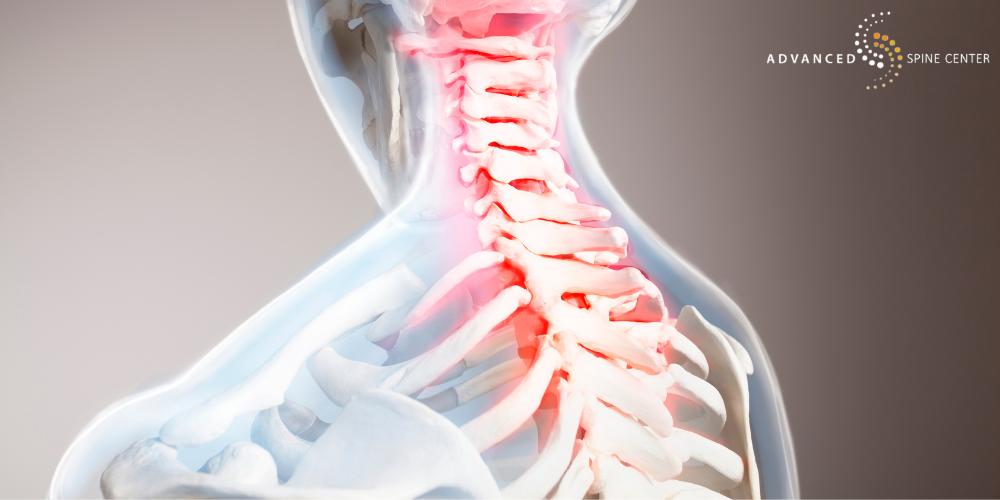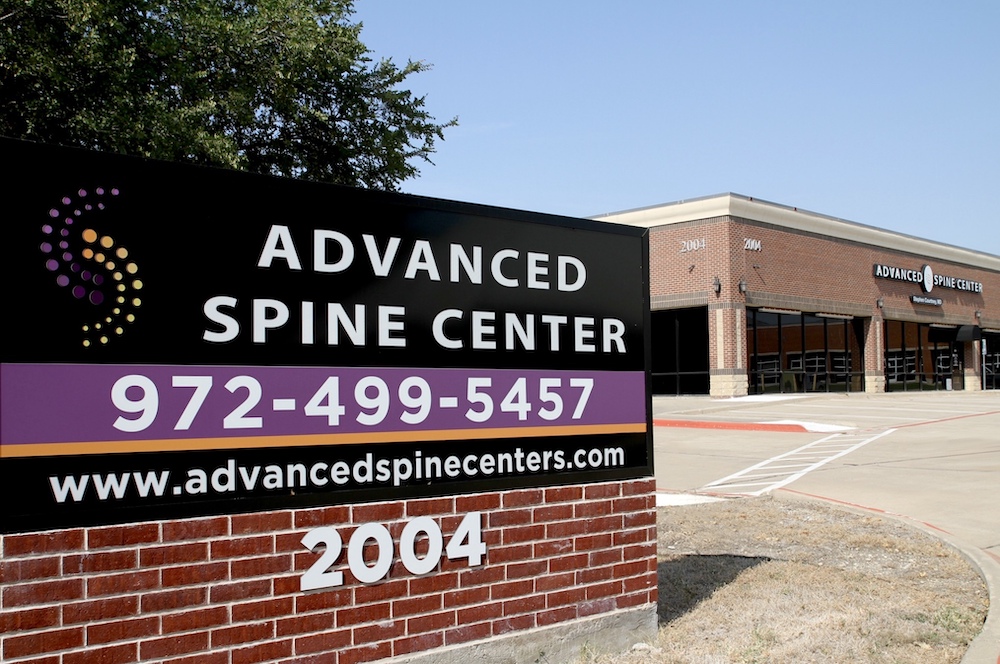Cervical Fusion Surgery Allen, TX
Home > Orthopedic Spine Surgeon Allen, TX > Cervical Fusion Surgery Allen, TX
Specialties

At the Advanced Spine Center, we offer a broad array of services and treatments aimed at treating painful cervical spine conditions. Our talented and compassionate spine team of physicians like Dr. Courtney is committed to providing exceptional patient care. If you suffer from a painful condition or injury in your cervical spine that’s keeping you from living your life, we’re here to help.
To schedule an appointment with us, call our office at 972-499-5457 today. You can also request an appointment online.
What Is Cervical Spinal Fusion?
Cervical spinal fusion is a surgical procedure performed to join or fuse two or more vertebrae in the cervical (neck) region of the spine. This process aims to stabilize the spine, reduce pain, and restore functionality by eliminating movement between the vertebrae for patients.
It involves using bone grafts, implants, or other materials to encourage the growth of new bone and fuse the vertebrae together, preventing motion at that particular position.
ACDF Surgery in Allen, TX
ACDF stands for Anterior Cervical Discectomy and Fusion. It’s a surgical procedure used to treat neck problems by removing a damaged or herniated disc in the cervical spine through the front of the neck.
Once the disc is removed, the affected vertebrae are fused together using bone grafts or implants, aiming to alleviate pressure on nerves, stabilize the spine, and reduce pain. This surgery helps restore spinal alignment and functionality in the cervical region.
Posterior Cervical Spinal Fusion
Posterior cervical spinal fusion is a surgical procedure performed on the back of the neck to stabilize and fuse two or more vertebrae in the cervical spine. It allows the surgeon to access the spine through the back of the neck, placing bone grafts or implants between the vertebrae, and using instrumentation to promote fusion. This surgery aims to alleviate pain, improve spinal stability, and address various cervical spine conditions.
When Is Cervical Spine Fusion Recommended?
Cervical spine fusion may be recommended by a provider in several scenarios, including the following.
- Fractures or Trauma: In cases of severe injury or fractures in the cervical spine.
- Instability: When the cervical spine lacks stability due to conditions like spondylolisthesis or after the removal of tumors.
- Failed Previous Surgery: In situations where prior surgeries have not resolved issues and fusion is necessary for stability.
The recommendation for cervical spine fusion is typically made after a thorough evaluation, considering the patient’s symptoms, medical history, diagnostic tests, and the failure of conservative treatments. It’s crucial to consult with a spine specialist in Allen to determine the appropriateness of this procedure for individual cases.
What Conditions Does Cervical Spinal Fusion Surgery Treat?
Cervical spinal fusion surgery is utilized to address various conditions affecting the cervical spine. These conditions include the following.
- Degenerative Disc Disease: Fusion stabilizes the spine by eliminating motion between vertebrae affected by degeneration, reducing pain and improving function.
- Herniated Disc: When a disc in the cervical spine ruptures or bulges, pressing on nerves and causing pain or weakness, fusion helps by removing the damaged disc and stabilizing the affected area.
- Spinal Stenosis: Fusion surgery can relieve pressure on the spinal cord or nerves in cases where the spinal canal in the neck becomes narrowed, alleviating associated symptoms.
Cervical spinal fusion aims to alleviate pain, improve stability, and enhance overall functionality by fusing vertebrae together, reducing motion in the affected neck area. Consulting with a spine specialist is crucial before undergoing fusion surgery.
How Can You Prepare for Cervical Fusion in Allen, TX?
Now that you’ve finally concluded your search for top-notch spinal care, it’s time to prepare for your procedure. Preparing for cervical fusion in Allen, TX, involves several steps, including the following.
- Evaluation: Comprehensive medical assessment and imaging tests.
- Consultation: Discuss procedure details, risks, and recovery.
- Medication/Lifestyle: Adjust medications, lifestyle habits, and diet.
- Follow Instructions: Adhere to pre-surgery guidelines provided by the healthcare team.
- Physical Preparation: Exercise for strength and flexibility improvement.
- Home Arrangements: Plan for post-operative care and comfort at home.
- Mental Readiness: Stay positive, seek support, and address concerns with the medical team.
Following these steps ensures readiness for surgery and enhances the prospects of a successful recovery at The Advanced Spine Center.
What Is the Cervical Fusion Surgery Process Like?
Cervical fusion surgery is a multi-step process designed to stabilize the cervical spine.
- Anesthesia: You’ll receive general anesthesia to ensure you’re unconscious and pain-free during the surgery.
- Incision: The surgeon makes an incision in the front (anterior approach) or back (posterior approach) of the neck to access the cervical spine and epidural space.
- Disc Removal: If performing Anterior Cervical Discectomy and Fusion (ACDF), the damaged disc is removed. For posterior fusion, bone spurs or damaged bone are addressed.
- Bone Grafting: Bone graft material (from your body or a donor) is placed between the vertebrae to promote fusion. Sometimes, metal plates, screws, or cages are used to stabilize the area.
- Fusion Stimulation: The surgeon stimulates bone growth and fusion using biological substances, encouraging the vertebrae to fuse together naturally over time.
- Closure: Once the grafts and hardware are in place, the incision is closed with sutures or staples. After this, the surgery is complete.
What Is Cervical Fusion Recovery Like?

Cervical fusion recovery involves initial hospitalization, discomfort, and limitations in movement. You’ll wear a neck brace and avoid strenuous activities. Physical therapy begins, gradually improving mobility and strength over several months. Follow-up appointments track bone healing, allowing a return to normal activities based on your surgeon’s guidance. Adherence to post-operative instructions and regular monitoring ensure a successful recovery.
Things to Avoid After Cervical Fusion Surgery
After cervical fusion surgery, avoid the following.
- Strenuous Activities: Heavy lifting, bending, or twisting should be avoided to prevent strain on the healing spine.
- Abrupt Movements: Sudden or jerky neck movements that may disrupt the fusion process.
- Poor Posture: Maintaining proper posture and avoiding positions that stress the neck is crucial.
- Smoking: Smoking hinders bone healing, so it’s best to avoid tobacco products.
- Skipping Medications: Follow prescribed medication schedules diligently for pain management and healing support.
- Ignoring Doctor’s Advice: Always follow your surgeon’s instructions regarding activities, restrictions, and follow-up appointments for a smooth recovery.
Potential Risks and Complications of Cervical Spinal Fusion
Cervical spinal fusion surgery poses risks, including infection, bleeding, and potential nerve injury resulting in numbness or weakness in the arms. Nonunion, where bones fail to fuse properly, or adjacent segment disease, causing issues in nearby vertebrae, are possible complications. Hardware complications, like movement or irritation by screws or plates, might require removal. Additionally, as with any surgery, there’s a general risk of adverse reactions to anesthesia.
While these complications are rare, it’s crucial to discuss them with your providers beforehand. Following post-operative care instructions diligently and maintaining regular follow-ups can help minimize risks and ensure a smoother recovery. Collaboration with your healthcare team is key to addressing concerns promptly and ensuring optimal recovery after cervical fusion surgery.
Who Is Considered a Good Candidate for Cervical Fusion in Allen?
Good candidates for cervical fusion are individuals with specific spinal conditions like degenerative disc disease, herniated discs, spinal stenosis, fractures, or instability in the cervical spine. Cervical fusion may be recommended when conservative treatments fail to alleviate symptoms and when the spine’s stability needs restoration.
Candidates typically undergo thorough evaluation, including medical history, imaging tests, and consultations with spine specialists. Those committed to adhering to post-operative guidelines, including lifestyle changes and rehabilitation, tend to have better outcomes.
However, the determination of candidacy for cervical fusion surgery is made on a case-by-case basis after careful assessment by a healthcare professional.
Call the Advanced Spine Center for Cervical Spinal Fusion in Allen, TX
At the Advanced Spine Center, Dr. Stephen Courtney is your premier provider of outstanding spinal care. He earned his medical degree at the LSU Shreveport School of Medicine, and went on to further his education through his orthopedic residency at Texas A&M and his spine fellowship training at the Florida Neck & Back Institute. He has earned the respect of peers and patients alike for both his skills in treating patients and his compassionate demeanor.
If you’re looking for the top orthopedic spine surgeon in Allen, schedule an appointment to visit the Advanced Spine Center. Call our office today at 972-499-5457 or submit an online intake form.

Request an Appointment
Common Patient Questions
ExcellentBased on 147 reviews
 Robert AliceaThe doctor and his staff were very welcoming and kind ..explained my issues in detail . Will highly recommend
Robert AliceaThe doctor and his staff were very welcoming and kind ..explained my issues in detail . Will highly recommend German CisnerosEvery visit to Dr. Courtney's office is educational and most beneficial. Dr. Courtney and ALL of his staff are the best!
German CisnerosEvery visit to Dr. Courtney's office is educational and most beneficial. Dr. Courtney and ALL of his staff are the best! Jamey DerryberryMy wife and I both go to Dr Courtney for back issues. Great care. Great staff. Great surgical facility and smooth process. LOVE THEM!!!
Jamey DerryberryMy wife and I both go to Dr Courtney for back issues. Great care. Great staff. Great surgical facility and smooth process. LOVE THEM!!! Mark CotterDr Courtney and his staff truly care about my well being. They are the only ones I have found that have been able to help me with my workman's comp claim
Mark CotterDr Courtney and his staff truly care about my well being. They are the only ones I have found that have been able to help me with my workman's comp claim J “JAFO”Does your back hurt? Has your back been hurting, yet no other surgeon can or won't help you; or worse tells you nothing is wrong? You're in the wrong place! I had 4 back operations with no improvement. I had an additional 6 other consultations with "there's nothing wrong with you". The truth was I was probably 2-3 months away from permanent leg and lower back paralysis. He fixed me. I can stand, I can walk. I threw away my crutches of 13 years. If you need back correction - GO SEE THIS DOCTOR! He will fix you, and fix you correctly, if it is humanly possible. Enough said! Go see him. He tells the truth and tells it like it is. 🙂
J “JAFO”Does your back hurt? Has your back been hurting, yet no other surgeon can or won't help you; or worse tells you nothing is wrong? You're in the wrong place! I had 4 back operations with no improvement. I had an additional 6 other consultations with "there's nothing wrong with you". The truth was I was probably 2-3 months away from permanent leg and lower back paralysis. He fixed me. I can stand, I can walk. I threw away my crutches of 13 years. If you need back correction - GO SEE THIS DOCTOR! He will fix you, and fix you correctly, if it is humanly possible. Enough said! Go see him. He tells the truth and tells it like it is. 🙂 Terri StewmanDr courtney and his staff are great! Dr courtney always takes his time with you and I feel he truly cares about his patients.
Terri StewmanDr courtney and his staff are great! Dr courtney always takes his time with you and I feel he truly cares about his patients. Ross WigingtonGreat Dr and helped me multiple times over the years Would recommend to anyone that needs help
Ross WigingtonGreat Dr and helped me multiple times over the years Would recommend to anyone that needs help Bridgette e MentesanaDr. Courtney is knowledgeable and takes the time to really explain what’s going on and explain why you’re in pain and the several options to correct the issue. I never felt rushed and he was on time to our appointment which is such a rare thing. The rest of the office staff was absolutely top notch. They were really down to earth and so nice, you could tell they liked their jobs and were treated well. It was a very welcoming atmosphere. I felt very comfortable and I knew I was in capable hands just by the way he treated his staff and listened to his patients. Highly recommend.
Bridgette e MentesanaDr. Courtney is knowledgeable and takes the time to really explain what’s going on and explain why you’re in pain and the several options to correct the issue. I never felt rushed and he was on time to our appointment which is such a rare thing. The rest of the office staff was absolutely top notch. They were really down to earth and so nice, you could tell they liked their jobs and were treated well. It was a very welcoming atmosphere. I felt very comfortable and I knew I was in capable hands just by the way he treated his staff and listened to his patients. Highly recommend. Marie BentonDr Courtney did my neck surgery and my 360 back surgery. I would not go to another surgeon, he cares about his patients and it shows! His staff is great as well! I trust his opinion and skills 100%
Marie BentonDr Courtney did my neck surgery and my 360 back surgery. I would not go to another surgeon, he cares about his patients and it shows! His staff is great as well! I trust his opinion and skills 100%

